

Plagiarism. Plagiarism. What Is Cyberbullying. Cyberbullying is bullying that takes place over digital devices like cell phones, computers, and tablets.
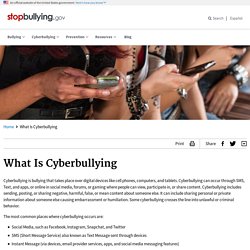
Cyberbullying can occur through SMS, Text, and apps, or online in social media, forums, or gaming where people can view, participate in, or share content. Cyberbullying includes sending, posting, or sharing negative, harmful, false, or mean content about someone else. It can include sharing personal or private information about someone else causing embarrassment or humiliation. Some cyberbullying crosses the line into unlawful or criminal behavior. The most common places where cyberbullying occurs are: Cyberbullying - National Bullying Prevention Center. Just as the use of technology itself has evolved, so has the ability to bully. Bullying, once restricted to the school or neighborhood, has now moved into the online world. Bullying through the use of technology is referred to as “cyberbullying.”
Cyberbullying is the use of technology to repeatedly and intentionally harass, hurt, embarrass, humiliate, or intimidate another person. As adults, thinking back, it was just a generation ago that kids and teens were asking their parents for a phone in their room — maybe even one with a separate line or three-way calling — so they could easily and somewhat privately connect with more friends. Today, a kid or teen’s desire to connect with friends has not changed, but the options for doing so have grown tremendously. Cyberbullying can happen anywhere there is online social interaction. Cyberbullying: Definition and Dynamics 1. electronic forms of contact 2. an aggressive act 3. intent 4. repetition 5. harm to the target (Hutson, 2016 )
Safe Internet – Internet Piracy & Infringement. We are all familiar with the term piracy and its original historical meaning, which was basically a description used for robbery with violence at sea by pirates.
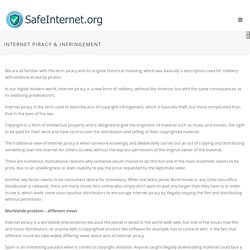
In our digital modern world, internet piracy is a new form of robbery, without the violence, but with the same consequences as its seafaring predecessors. Internet piracy is the term used to describe acts of copyright infringement, which is basically theft, but more complicated than that in the eyes of the law. Copyright is a form of intellectual property and is designed to give the originator of material such as music and movies, the right to be paid for their work and have control over the distribution and selling of their copyrighted material.
The traditional view of internet piracy is when someone knowingly and deliberately carries out an act of copying and distributing something over the internet for others to view, without the express permission of the original owner of the material. Worldwide problem – different views. Internet Piracy. Megan Ptak, Wylder Tallman, Derek Holbrook, Maria DiPilato, Jaime McGrath 11 December 2017 Intro to Communication & Media.
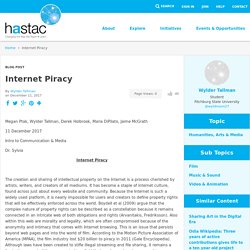
Fair Use. The policy behind copyright law is not simply to protect the rights of those who produce content, but to "promote the progress of science and useful arts.
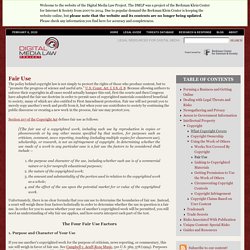
" U.S. Const. Art. I, § 8, cl. 8. Because allowing authors to enforce their copyrights in all cases would actually hamper this end, first the courts and then Congress have adopted the fair use doctrine in order to permit uses of copyrighted materials considered beneficial to society, many of which are also entitled to First Amendment protection. Section 107 of the Copyright Act defines fair use as follows: Copyright and Fair Use Guidelines- UMUC Library. Online Disinhibition Effect. The Internet has brought about numerous changes in social relationships, and the online disinhibition effect has been heavily discussed and documented.
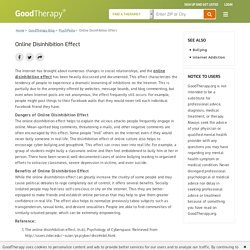
This effect characterizes the tendency of people to experience a dramatic loosening of inhibitions on the Internet. This is partially due to the anonymity offered by websites, message boards, and blog commenting, but even when Internet posts are not anonymous, the effect frequently still occurs. For example, people might post things to their Facebook walls that they would never tell each individual Facebook friend they have. Dangers of Online Disinhibition Effect The online disinhibition effect helps to explain the vicious attacks people frequently engage in online. Mean-spirited blog comments, threatening e-mails, and other negative comments are often encouraged by this effect.
Reference: The online disinhibition effect. Last Updated: 08-12-2015 Please fill out all required fields to submit your message. Please confirm that you are human. Take Charge of Your Online Reputation. Managing one's online reputation is important for anyone in the workforce today. Advice for students entering the job market is equally applicable to those in other career stages looking to successfully manage their online reputations. This is a primer about online reputation management, which can be shared with students entering the job market. The advice provided here is also useful for others who may be further along in their careers.
Many of us have devoted our careers to higher education, proudly watching class after class come in and work their way through college toward graduation. We support them with learning and extracurricular activities to develop well-rounded people. Those graduating this year are already turning their attention to recruiting fairs and future employment. Left: Applicants about whom negative information was found online. What Is Your Online Reputation? Why Does It Matter? First, Partition and Clean Up Your Act Today's students have grown up online. Notes.